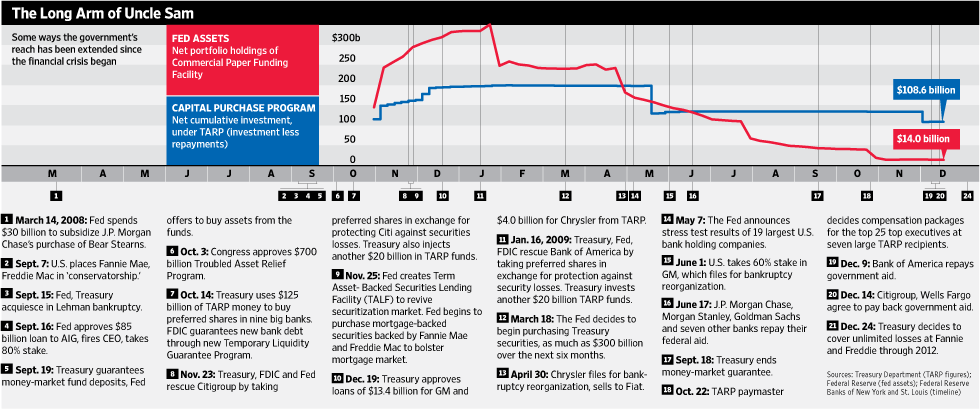NOTE: Every week I write a Client Note for my clients. For a limited time, I am allowing non-clients to sign up and receive the Client Note. You can sign up at the top right hand corner of the website. I will also be posting the notes on my blog with a 24-48 hour delay from time to time. Here is this week’s.
*****

To every action there is always an equal and opposite reaction.
– Newton’s 3rd law of motion
Yesterday I read a terrific overview of all the bailouts on the front page of
The Wall Street Journal. The accompanying timeline (see above) is especially useful. In today’s editorial section I read
“Prepare for a Keynesian Hangover” by Benn Steil, Director of International Economics at The Council on Foreign Relations.
As we usher in the New Year with the major indexes hitting 52 week highs and a
net 80% of respondents to Merrill Lynch’s monthly fund manager survey believing the global economy will strengthen over the next 12 months, I have to wonder: What are the consequences of the “orgy of spending and money creation”, in Steil’s words, coming out of Washington? Are the bulls even asking this question? Is it really possible that such an unprecedented government binge would have no consequences? Has that famous economic maxim “there’s no such thing as a free lunch” been repealed?
One way of characterizing what has happened is that the government has socialized risk. That is, risks that were once Bank of America’s, Citigroup’s, General Motors’s, etc.. have now been taken onto the Federal Government’s balance sheet. That is good for B of A, Citi, GM and all the other bailed out companies (and companies who have indirectly benefitted from the bailouts), but it just transfers the risk from them to the federal government.
What are these risks?
As we all hear pretty much daily now, the federal government is now running annual deficits in excess of $1 trillion. That is, they are spending a trillion more dollars than they are taking in on an annual basis. Where does this extra money come from? Some of it comes from selling treasuries and some of it comes from Fed money creation. A good deal of the buying in the treasury market comes from China.
In addition to the deficit, the Federal Reserve is making money available to financial institutions very cheaply as well as purchasing trillions of dollars of financial assets such as Fannie and Freddie mortgage backed securities.
But there are limits to all this borrowing and money creation. If investors and creditors lose confidence in the dollar, the foundation of everything, interest rates will rise, causing debt servicing costs to suck an ever greater proportion of the federal budget and causing similar strains throughout our overleveraged economy.
In addition, the dollar will fall causing prices for all the things we import to rise. Given how much we import from China, the $/Yuan exchange rate would seem to be especially important. China holds that exchange rate fixed – for now. Were they to let the market determine that exchange rate, everybody knows the Yuan would surge against the dollar, dramatically increasing the price of all the things we buy from China that stock the shelves of Walmart, CVS, Best Buy, etc…
That’s why this rally is dangerous and I am distrustful of it. Currently, we are enjoying the high from all the stimulus coursing through the economy. But at some point, the stimulus will wind down or the dollar will crack. When either of those things happens, what will be the effect on the economy and the stock market?
The difficult part is the timing. Many bet against the tech bubble but were crushed by being too early. Same for the housing market. Keynes famously said “the market can stay irrational longer than you can stay solvent.” That’s why we have to respect this rally even as we doubt its fundamental rationale and ultimate sustainability. That is the balance I am currently trying to strike and implement in our portfolios. It is quite a challenge but I am game.
Greg Feirman
Founder & CEO
A Registered Investment Advisor
9700 Village Center Dr. #50H
Granite Bay CA, 95746
(916) 224-0113
CALL NOW FOR A FREE INITIAL CONSULTATION!

